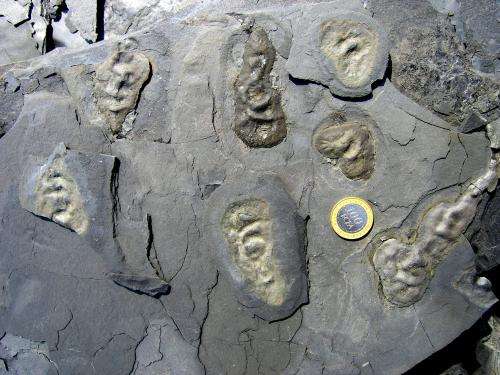October 1, 2013 report
New evidence suggests Earth's oxygen levels fell after the Great Oxidation Event

(Phys.org) —A team of European researchers has published a paper in the journal Proceedings of the National Academy of Sciences, offering a possible explanation for the apparent drop in early Earth's oxygen levels following what has come to be known as The Great Oxidation Event. In their paper, the team suggests evidence found in ocean sediments indicates that a sudden addition of carbon into the atmosphere resulted in a relatively quick reduction in oxygen.
Scientists have found multiple sources that indicate that approximately 2.3 billion years ago, oxygen levels in the atmosphere (and oceans) increased dramatically—they've named it the Great Oxidation Event. Though scientists can't explain exactly why this happened, they do believe it occurred during a time of major glaciation, and was perhaps the result of the evolution of bacteria. Since that time, scientists have believed that changes in oxygen levels have been the result of a series of steps rather than great upheavals. Now, new research by the European team suggests that a change of thinking might be in store.
To try to better understand what went on with the atmosphere as the Earth was evolving from a lifeless planet to the rich biota filled environment of today, scientists look to rocks formed millions or even billions of years ago, and to ocean sediments. In this latest effort, the research group looked to such samples gathered from the ocean floor off the coast of western Africa's Republic of Gabon. Because sediments collect so slowly over time, analyzing them offers a glimpse into the past, similar in many respects to ice samples taken from polar climates.
The samples they retrieved offered evidence of ocean (and therefore atmospheric) oxygen levels, before, during and after the Great Oxidation Event, and surprisingly, indicated that shortly after the large infusion of oxygen, there was a fall. The researchers attribute this fall to an increase in carbon and iron in the atmosphere, part of what they call the largest positive carbon-isotope excursion in the history of the planet. The oxygen reacted, they say, with iron and carbon forming oxides that were carried to the ocean floor. Though the carbon excursion can't be explained either, it is believed it was likely tied to the evolution of life in the oceans.
More information: Oxygen dynamics in the aftermath of the Great Oxidation of Earth's atmosphere, Published online before print September 30, 2013, DOI: 10.1073/pnas.1315570110
Abstract
The oxygen content of Earth's atmosphere has varied greatly through time, progressing from exceptionally low levels before about 2.3 billion years ago, to much higher levels afterward. In the absence of better information, we usually view the progress in Earth's oxygenation as a series of steps followed by periods of relative stasis. In contrast to this view, and as reported here, a dynamic evolution of Earth's oxygenation is recorded in ancient sediments from the Republic of Gabon from between about 2,150 and 2,080 million years ago. The oldest sediments in this sequence were deposited in well-oxygenated deep waters whereas the youngest were deposited in euxinic waters, which were globally extensive. These fluctuations in oxygenation were likely driven by the comings and goings of the Lomagundi carbon isotope excursion, the longest–lived positive ?13C excursion in Earth history, generating a huge oxygen source to the atmosphere. As the Lomagundi event waned, the oxygen source became a net oxygen sink as Lomagundi organic matter became oxidized, driving oxygen to low levels; this state may have persisted for 200 million years.
Journal information: Proceedings of the National Academy of Sciences
© 2013 Phys.org





















